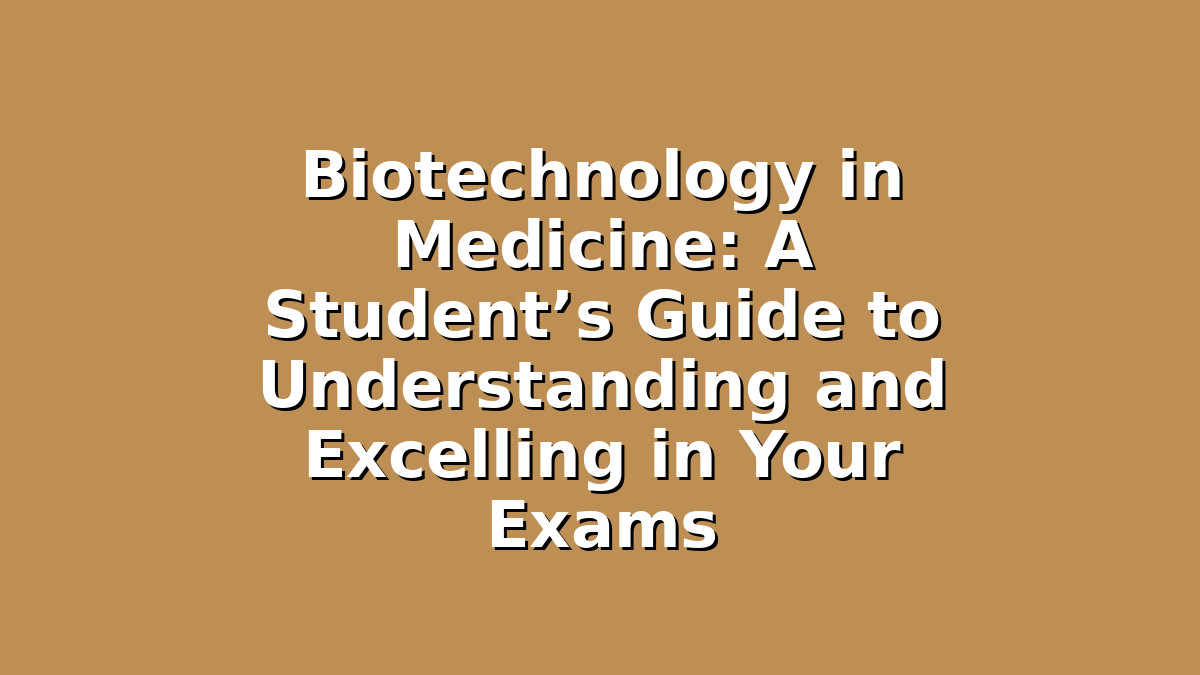Biotechnology has revolutionized the field of medicine, offering groundbreaking ways to diagnose, treat, and prevent diseases. For students preparing for exams in biology, medicine, or related subjects, mastering the concepts of biotechnology can seem daunting. However, with the right approach and study strategies, you can not only understand this complex topic but also excel in your exams. This article will explore key aspects of biotechnology in medicine and provide effective study tips to help you grasp the material confidently.
Introduction to Biotechnology in Medicine
Biotechnology involves using living organisms or their systems to develop useful products and technologies. In medicine, it has paved the way for innovative treatments such as gene therapy, personalized medicine, and advanced diagnostic tools. Understanding how biotechnology works, its applications, and its ethical considerations is essential for students aiming to succeed in modern biology and medical exams.
As you dive into your studies, keep in mind that biotechnology ties together various disciplines, including genetics, molecular biology, and biochemistry. Developing a clear understanding of foundational concepts will make it easier to grasp the advanced topics you encounter in your coursework.
—
Section 1: Grasping Core Concepts of Medical Biotechnology
Before delving into complex applications, focus on mastering the basic principles of biotechnology. Here are essential topics you should know:
– Genetic Engineering: This involves modifying an organism’s DNA to achieve desired traits or to produce therapeutic products like insulin.
– Recombinant DNA Technology: Understand how DNA molecules from different sources are combined to create new genetic combinations.
– Monoclonal Antibodies: Learn how these antibodies are produced and their role in targeted therapies.
– Stem Cell Therapy: Study the potential of stem cells in regenerating damaged tissues and organs.
Study Tip: Use visual aids such as diagrams, flowcharts, and videos to better understand these processes. Drawing your own diagrams can reinforce learning and help memory retention. Try to explain these concepts aloud as if teaching someone else—this method, known as the Feynman technique, deepens understanding.
—
Section 2: Connecting Biotechnology Applications to Medical Treatments
Linking theoretical knowledge to real-world medical applications makes your study more meaningful and exam answers more impressive. Focus on how biotechnology has transformed medicine through:
– Gene Therapy: The process of correcting defective genes responsible for disease development. For example, treatments for cystic fibrosis and certain types of cancer.
– Personalized Medicine: Tailoring treatment based on an individual’s genetic profile to improve efficacy and reduce side effects.
– Vaccines and Immunotherapy: Biotech advances have led to new types of vaccines, including mRNA vaccines used during the COVID-19 pandemic.
– Diagnostic Tools: Techniques like PCR (polymerase chain reaction) that detect genetic material of pathogens quickly and accurately.
Study Tip: Create case studies or flashcards summarizing various therapies and diagnostic tools. This active recall method reinforces knowledge and prepares you to answer scenario-based questions in exams. Additionally, try to stay updated with recent breakthroughs—many exam boards appreciate current examples.
—
Section 3: Preparing for Exams: Effective Study Strategies for Biotechnology in Medicine
Studying biotechnology requires both memorization of facts and deep conceptual understanding. Here are some strategies to help you prepare effectively:
– Break Down Complex Topics: Divide your syllabus into smaller chunks and focus on one at a time. For example, dedicate a study session to genetic engineering and another to diagnostic techniques.
– Practice Past Papers: Familiarize yourself with the exam pattern and question types. Practice writing clear, concise answers that cover applications, mechanisms, and ethical implications of biotechnology.
– Group Study and Discussions: Collaborate with classmates to discuss difficult topics. Teaching peers can enhance your own grasp of the material.
– Use Mnemonics and Analogies: Biotechnology terms can be technical; mnemonics and relatable analogies can help recall information faster.
– Stay Organized: Maintain well-structured notes, highlighting key terms, definitions, and diagrams. Summaries at the end of each topic help in quick revisions before the exams.
Study Tip: Take regular breaks during study sessions to avoid burnout and maintain focus. The Pomodoro technique (25 minutes study, 5 minutes break) can improve concentration and productivity.
—
Conclusion
Biotechnology in medicine is an exciting and rapidly evolving field with tremendous implications for healthcare. As a student, mastering this topic will not only boost your exam performance but also prepare you for future studies or careers in science and medicine. By focusing on core concepts, connecting theory to practice, and employing effective study strategies, you can confidently navigate the complexities of biotechnology.
Remember, consistency and active learning are key. Approach your studies with curiosity and confidence—you have the power to excel in biotechnology and make the most of this fascinating field.
Good luck with your exams!

Responses